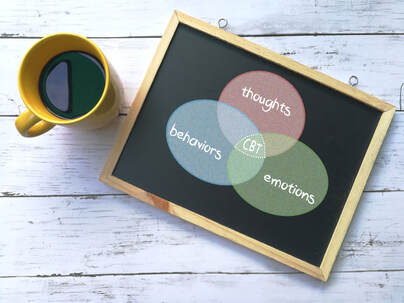Understanding the Connection Between Thoughts, Emotions, and BehaviorsWritten by Anna Perkowski, MSW, LCSWAs 2023 continues and a new month unfolds, I wanted to share some tools about staying motivated, identifying and resolving barriers, and engaging in healthy reflection in order to make & maintain progress toward goals using CBT.
Our thoughts are powerful. I think this becomes super evident during times of stress - all of a sudden, it's easy to downward spiral into thinking "nothing ever works out," "I always mess it up," and "nobody cares." The key is to slow down and recognize when words such as "always," "ever," "never," "nobody," and "everybody" play through your mind. Part two is to become curious. Some examples of becoming curious about these thoughts are: "Things have NEVER worked out before?", "Is there an example of a time when something did work out well?", "Do I ALWAYS mess things up?" "Is there a time where I did something and found success?" Slow down, pause, and be mindful and curious about thoughts that include words such as "always," "never," "ever," "nobody," and "everybody." Emotions are helpful in providing information. Here's some examples of how: anger is helpful and might inform a person that healthy boundaries need to be put in place in some area of life. Sadness is helpful and might inform other people that the person feeling sad may need some extra support and connection. Nervousness is helpful and might show a person what they care about. Fear is helpful and might alert a person to actual danger in order to stay safe. Emotions aren't "bad." It is common for clients to experience aversion to emotions, especially anger and sadness. The unfortunate reality is that emotions can't be cherry-picked, meaning I can't choose to avoid feeling angry and still hope to experience joy at full capacity. If I numb anger, overtime, I will also numb joy. Emotional identification, expression, and regulation are key techniques in experiencing healing & progress. To help clients identify emotions I sometimes ask clients to imagine what that emotion could look like. What color would anger be? How much room would it take up? Does it show up physically somehow - tensed muscles, an increase in body temperature? Using a feelings wheel can also prove to be beneficial in this stage of emotion identification. To help clients express difficult emotions, I will reflect the emotion I see based on how the client identified it would look like. I pause for a minute. Silence is helpful in providing intentional space for emotions that may have been invalidated in the past. To help clients emotionally regulate, I'll invite clients to practice a grounding exercise and one of their favorite breathing techniques. Emotions aren't "bad." However, sometimes the behaviors that follow as a result of the emotion can be unhealthy and unhelpful. This is part of the process where clients begin unlearning ways of being that are no longer helpful. Let's use this example: "I'm not good enough and always fail at things" --> leads to feelings of X (maybe anxiety, sadness, anger, etc.) --> leads to X behavior (avoidance of activity, numbing/excessive use of substance or social media, etc) and the cycle continues. Due to the behavior including avoidance of the activity in an attempt to minimize difficult emotions, the unhelpful thought of "I'm not good enough and always fail at things" is reinforced. The goal is to educate clients about the connection between thoughts, emotions, and behaviors and then to increase awareness of the internal thought process and how it impacts emotions and behaviors. I'd ask what type of behaviors would become easier if happiness was experienced and anxiety lessened? What barriers, if any, need to be identified and resolved? And then together, that's how an action plan is created. Action plans can be written down or they can be verbalized. Clients would also be encouraged to "give themselves credit" once they accomplish parts of their action plan that week - that could look like practicing verbal affirmation or writing a positive affirmation on a post-it note. Prior to the end of a session, clients are asked to summarize what the action plan steps are for the week. This helps clients feel confident in being capable of producing change in their own lives. Comments are closed.
|
OakHeart
|
- Home
- Counseling
-
Specialties
- Depression
- Bipolar Disorder
- Anxiety Disorders >
- Obsessive-Compulsive Disorder (OCD)
- Eating Disorders
- Grief and Bereavement
- ADHD
- Maternal Mental Health
- Infertility, Miscarriage, and Neonatal Loss
- Domestic Violence and Sexual Assault
- Posttraumatic Stress Disorder (PTSD) >
- Trauma
- Non-Suicidal Self-Injury (NSSI)
- Substance Use Disorders (SUD)
- Anger Management
- Insomnia
- Divorce Recovery
- Relationship Concerns and Couples Counseling
- Self-Esteem
- Therapy for Therapists
- LGBTQA+ Support
- Faith-Based Counseling
-
Providers
- Erin Mitchell
- Pamela Heilman
- Katie Sheehan
- Hillary Gorin
- Lee Ann Heathcoat
- Adam Ginsburg
- Megan Noren
- Sarah Williams
- Christina Bieche
- Bridgette Koukos
- Laura Lahay
- Kate Nash
- Anna Perkowski
- Alma Lazaro
- Leah Arthur
- Marissa Vogrin
- Erin Blair
- Amy Jakobsen
- Lizzy Lowe
- Tony Fasano
- Gerry Lawm
- Vanessa Osmer
- Kat Harris
- Locations
- Contact
- Treatments
- Employment
- FAQ and Notices
- OakHeart Blog
- Administrative and Leadership Team
- Mental Health Resources
- Divorce Mediation
- Professional Consultation
|
|




